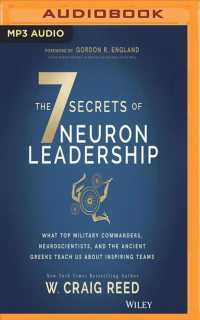- ホーム
- > 洋書
- > 英文書
- > Philosophy
基本説明
This book contains Hunt's Latin edition with a new English translation and a new introduction to the text by Michael Dunne.
Full Description
Since the publication of the edition of John Blund's Tractatus de anima by the British Academy in 1970 there has been widespread acceptance of the importance of this text for the history of thought. Blund (ca. 1175-1248) was probably one of the first commentators on the libri naturales at Paris before the prohibition of 1210, and later introduced them to Oxford. Indeed, apart from the prohibitions of 1210 and 1215, the De anima of Blund is the one text which sheds light on the first reception of Aristotle at Paris. The text was probably composed at Paris, before 1204.
Blund taught arts at Paris ca. 1200-1205, then at Oxford towards 1207-1209. He returned to study theology at Paris during the interdict (1208-1214) and the contemporaneous suspension of the schools at Oxford (1209-1214). He was regent in theology at Paris for twelve years, and taught theology at Oxford after 1229.
With the Tractatus a whole area of philosophical speculation - namely Greek and Arabic psychology - arrived at Oxford, where it would continue to grow and be debated throughout the century. Blund did not know Averroës but he reflects the state of Latin Aristotelianism during the first third of the thirteenth century. Like his contemporaries Blund regarded the De anima of Avicenna as a commentary on Aristotle; indeed they found it clearer than the text of Aristotle and were guided by it. Blund is faithful to Aristotle and to Avicenna, rejecting, for example, the binarium famosissimum drawn from the Fons vitae of Avicebron. In expounding the doctrine of Aristotle and following the plan laid out by Avicenna, he considers the arguments for and against before offering his own reasoned position in the solutio. He defends the role of the philosopher as considering the nature of the soul and as distinct from theological considerations.
This new English translation makes available this important text to a wider audience of scholars interested in philosophy, theology, medieval history and the history of science and psychology. Students who are learning medieval Latin will be able to follow the original Latin with the help of the parallel translation and text notes.
Contents
Introduction to the New Edition
Introduction to the Latin Edition of 1970
Addenda to the Latin Text
Sigla codicum
Index capitulorum (Chapter index)
Tractatus de anima secundum Iohannem Blondum
Appendix
Index auctorum (Index of authors)
Index nominum et verborum potiorum (Index of names and key words)
Subject Index








